Chesa Boudin on Colombia’s Civil War
A new book casts an illuminating spotlight on Colombia’s guerrilla war, fueled by cocaine profits and U.S. military aid.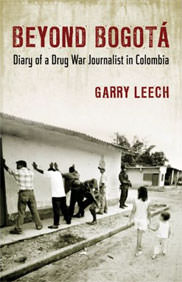
In February 2007 I visited Colombia’s Chocó region as a guest of local Afro-Colombian and indigenous communities that had previously suffered forcible eviction from their communal lands. The phenomenon, known as forced migration or internal displacement, is so widespread across Colombia that the country trails only Iraq and Sudan in its number of internally displaced people. The communities that hosted me in Curvarado and Cacarica had recently returned to their homes after years of abuse at the hands of illegal paramilitary organizations intent on controlling their ancestral lands. Thanks to their determined efforts and support from a local NGO, Justicia y Paz (Justice and Peace), my hosts had been able to obtain legal title to their communal lands, an anomaly in a country where most forcibly displaced people lack the necessary resources or connections to navigate the legal bureaucracy. Despite their title to the land these communities remained frightened about threats from armed groups, so Justicia y Paz stationed observers to help document trespassing or attacks.
The farmers who hosted me, and countless more farmers across Colombia, are caught in the midst of a conflict more complicated than most. Fueled by cocaine profits and U.S. military aid, it has raged for decades, pitting the government security forces and illegal paramilitary groups against various Marxist-inspired guerrilla movements. It is in this broader national context that fundamental human rights and self-determination of peoples come into constant, direct conflict with global economic growth and wealth accumulation in Colombia’s northwest Chocó region. The narrow isthmus, covered in mountainous tropical forests and dense swamplands, is increasingly the target site for potential development projects, including the completion of the Pan-American Highway, a pipeline to carry Venezuelan oil to Pacific ports, and an alternative shipping channel to the Panama Canal. In 1996, the price of land doubled following then-President Ernesto Samper’s announcement of a plan for a new inter-oceanic highway link connecting the Pacific and Atlantic. The Chocó has also attracted agriculture, timber, coal and mining interests both from Colombia and abroad. Peasants who happen to live on resource-rich territory suffer from a violent form of land speculation. In Colombia, neoliberal economic policies have gone hand in hand with militarization of a historic conflict.
“Beyond Bogotá: Diary of a Drug War Journalist in Colombia,” Gary Leech’s new book on Colombia, provides an engaging firsthand account of the country’s drug war. The book is structured around an 11-hour detention ordeal Leech underwent at the hands of the largest guerrilla group in the country, the Revolutionary Armed Forces of Colombia (FARC), in August 2006. Each of the 11 chapters in the book corresponds to one of the hours during which he was held at gunpoint on a coca farm in rural Colombia while the FARC higher-ups decided his fate. As Leech anxiously waits out his detention, he reflects back on his first trips to Latin America and his years reporting on Colombia’s drug war. The literary device succeeds; suspense and drama remain present throughout the book, and he provides an easy-to-follow background to the country’s civil strife, mostly narrated through first-person accounts. Luckily for Leech and his readers, he safely made it home to tell the tale. He writes with the raw passion and vivid energy of a wartime correspondent who regularly risks his life to cover stories ignored by major international media outlets. While most writers on Colombia only talk abstractly about policy, Leech goes into villages, speaks with people on the front lines and peels back the skin.
Demonstrating considerable courage and persistence, Leech managed to visit the hottest areas of Colombia’s conflict, survive shootouts and detentions, interview high-ranking leaders of the FARC and the AUC (United Self-Defense Forces of Colombia) and visit coca farms and cocaine labs. He describes all this with compelling narrative and evocative characters, taking the reader with him on his investigative adventures. While his descriptive ability makes the reading enjoyable, it is his conclusions that leave the strongest impression.
President Alvaro Uribe, currently in his second term, is a darling of the U.S. State Department and has funneled billions in U.S. aid into a military strategy for solving the country’s problems. Meanwhile, he implements neoliberal economic policies that exacerbate the very wealth disparities that Leech sees as the root of the ongoing violence. As governor of the province of Antioquia, Uribe was instrumental in establishing a civilian vigilante organization, CONVIVIR, that quickly became a right-wing paramilitary network fighting a vicious war against the country’s leftist guerrillas and anyone accused of sympathizing with them. Uribe’s own father was killed by the FARC in a botched kidnapping attempt, blurring the line between the political and the personal in his support for those fighting against the guerrillas. As Leech reports, the paramilitaries that grew out of Uribe’s CONVIVIR are widely believed to be responsible for the majority of civilian deaths and human rights abuses in Colombia. Like the FARC and sectors of the state military apparatus, the paramilitaries became involved in drug trafficking and use cocaine profits to fund their arms purchases and operations. The FARC taxes growers in the regions it controls, and Leech suggests that the paramilitaries and military are actively involved in the more lucrative processing and trafficking as well.
Leech explains how, after Sept. 11, 2001, the U.S. military aid to Colombia under the heading “Plan Colombia” rapidly shifted from anti-drug trafficking to combating “narco-terrorism.” The FARC (Fuerzas Armadas Revolucionarias de Colombia) and the national paramilitary organization AUC (Autodefensas Unidas de Colombia) appeared on the State Department’s list of terrorist organizations. While Leech is quick to condemn all of the armed groups in the conflict, much of his criticism is reserved for U.S. policy in the region. “There was also plenty of anti-American sentiment in Colombia, particularly in the rural regions targeted by Plan Colombia’s fumigations [of illegal coca crops]. Again, this anger wasn’t rooted in a hatred for U.S. freedoms; it resulted from U.S. government policies that destroyed the livelihoods of Colombian peasants without offering them any viable alternatives.” “Beyond Bogotá” gives voice to people whose opinions and perspectives are rarely included in mainstream media reports. Leech investigates a peasant massacre and finds that “U.S. military aid was being used as much to wage a war of terror as to fight a war against terror. At best, it appeared to be funding a selective war on terror—one that targeted civilians seen as suspected leftist terrorists, yet supported a military responsible for perpetrating state terrorism and maintaining close ties to right-wing terrorists.”
Moreover, according to Leech, the U.S.-led aerial fumigations of coca crops throughout Colombia have backfired; there is now a “super herbicide-resistant strain” of coca that is capable of yielding four times as many leaves from the same acreage. Thus, “although the U.S. and Colombian governments claimed that Plan Colombia was working because the fumigations were reducing the number of acres under cultivation … in reality coca production had remained relatively stable.” Meanwhile, Leech tells us, “Not only do coca farmers earn the least amount of profit among all those engaged in the production, trafficking, and sale of cocaine, but they are also the most vulnerable link in the chain because of their poverty and lack of mobility. Even with the widespread cultivation of coca, 85 percent of rural Colombians live in poverty. And at the close of the twentieth century, those poor farmers became the principal target in the U.S. war on drugs.”
President Uribe, a willing partner in the war on drugs, has succeeded in improving Colombia’s image in the international business community and increasing urban security. Yet the government presence in many rural areas is limited to military incursions without meaningful investment in development or economic and social infrastructure. Leech shows us the divide between rural and urban Colombia, narrating multiple political perspectives throughout. In one scene that takes place over a three-hour period, he interacts with pro-FARC rural peasants, then with nonaligned, pro-peace small-town residents, and finally with right-wing pro-Uribe urbanites.
Leech clearly knows Colombia intimately, and this makes the book. One area where “Beyond Bogotá” falls short, however, is that it lacks regional context. Colombia is just one country in a fascinating and rapidly changing region. In many ways Colombia is an outlier among its neighbors: While Colombia is still a close ally of the U.S. and an adherent to the Washington Consensus, Andean neighbors Venezuela, Ecuador and Bolivia, for example, have elected left-wing, anti-neoliberal, populist presidents, including Hugo Chavez, Rafael Correa and Evo Morales. Uribe appears to represent the old guard of Latin American governments, while Chavez’s 1999 election was the vanguard of a wave of progressive democratic victories across the region. This regional context has shaped U.S. aid to Colombia, as well as Uribe’s domestic policies, but is largely absent from the book. Also missing are recommendations for how Colombia might find its way out of its quagmire, or how the international community can help it do so.
Latin America is a rapidly changing region, and perhaps no country illustrates this better than Colombia. Writers focusing on current events there inevitably face the pitfall that nothing remains current for long. While this book is one of the most recent, most up to date on Colombia available today, crucial developments occurred after “Beyond Bogotá” went to press. Several of the key FARC leaders Leech writes about or interviewed for this book, including Simón Trinidad, Raúl Reyes and Manuel Marulanda, are no longer on the field of battle: Trinidad was caught and extradited to the U.S., where he is currently in prison; Reyes was killed by the Colombian military; and Marulanda died of natural causes. Moreover, the FARC’s most valuable hostages, among them one-time Colombian presidential candidate Ingrid Betancourt and several American civilian contractors, were rescued last summer in a daring raid coordinated by the Colombian military. What implications these developments have for the FARC’s viability as a national rebel army remain to be seen. For those interested, as I am, in Leech’s ongoing analysis of these issues and future developments in Colombia, it should be noted that he is the editor of a regularly updated Web site called Colombia Journal [under construction as this review is published].
As I was finishing reading “Beyond Bogotá”, I received an e-mail from Justicia y Paz, detailing threats and kidnappings of its members working in the communities in Curvarado. A series of anonymous phone calls had preceded the kidnapping of a human rights worker based in one of the formerly displaced communities I visited in 2007. Throughout Colombia, paramilitary groups are engaged in ongoing assaults on poor communities living on resource-rich land. U.S. military aid continues unabated, even as the Colombian military is complicit with these illegal attacks or simply looks the other way. This book is an excellent way to familiarize oneself with a multifaceted conflict that sadly shows no sign of letting up soon.
Chesa Boudin is the author of “Gringo: A Coming of Age in Latin America,” forthcoming from Scribner. He studied forced migration and public policy in Latin America at Oxford as a Rhodes Scholar and is currently enrolled in the Yale Law School.
Your support matters…Independent journalism is under threat and overshadowed by heavily funded mainstream media.
You can help level the playing field. Become a member.
Your tax-deductible contribution keeps us digging beneath the headlines to give you thought-provoking, investigative reporting and analysis that unearths what's really happening- without compromise.
Give today to support our courageous, independent journalists.


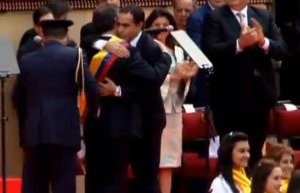
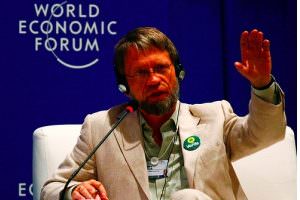
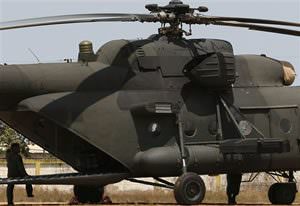
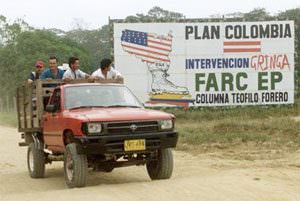
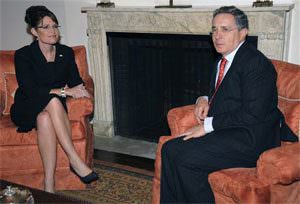


You need to be a supporter to comment.
There are currently no responses to this article.
Be the first to respond.